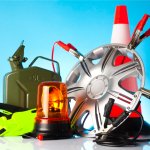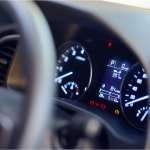Many vehicle owners love the feeling of having their car “get up and go” when they press on the accelerator.
However, being able to stop your car is even more important than getting it going in the first place. Brakes keep us alive on a regular basis but are generally ‘out of sight (or hearing), out of mind.”
By watching and listening for the warning signs, you can get your brakes serviced before you have a catastrophic failure. Here are signs you need to get your brakes looked at:
Worn Pad or Discs
You can check for brake wear by looking or listening. Take a look at your brakes through the openings in your wheels (if you have solid rims, you probably won’t be able to do this). You should be able to see at least ¼” (6.35mm) thick of pad material. If there is less than that, get your brakes inspected and replaced.
Alternatively, if you hear a high-pitched squeal when you apply your brakes, that’s from a small metal shim installed to act as an indicator your brakes are getting worn. While turning up the radio can make the sound “go away,” it won’t fix your brakes. Get them serviced.
Brake Fading
If your pedal sinks are mushy or the brakes aren’t as responsive as they used to be, you could have an air or brake fluid leak. Get your brakes serviced immediately. Leaking brake fluid will pool when the car is parked and looks a bit like fresh motor oil.
Pulling, Vibrating, or Pulsing
Brakes that pull to one side are indicative of uneven wearing of the brake pads and linings, or there is something in your brake fluid that is causing uneven brake pressure.
Brakes that vibrate or pulsate often indicate a problem with the rotors, usually from uneven surface wear or warping. Vibrations can be similar to what you’d feel during a panic stop in a car with anti-lock brakes (ABS). If the ABS are not engaged, that’s often rotor warpage.
Grinding or Growling
If you hear this, it’s the metal from the brake pad wearing directly into the rotor (different from the wear indicator squeal listed above), meaning you’ll need to have them “turned” on a lathe to even out the rotor surface or, if too badly scored, replaced. As with the warning squeal, turning up the stereo will help with the noise, but won’t fix your brakes. Don’t ignore it.
Your Dashboard Brake Indicator Light Is On
Many vehicles have brake pad sensors that monitor the wear level of your pads and will trigger the dashboard indicator light if the pads become too worn. Get your brakes serviced. Other reasons the indicator light could be one are low brake fluid, ABS issues or even a burned-out brake light. If your light is on, get your brakes inspected.
How Long Should New Brakes Last?
The general lifespan for brakes is about 50,000 miles (a bit over 80,000 kilometers). Your driving habits, conditions and other factors (towing trailers, exotic vehicles, etc.) literally mean your mileage could vary, with some brakes needing replacement at 25,000 miles and some lasting as many as 70,000.
Regularly getting your brakes inspected will help prolong their life and make for a safer driving experience. Don’t let “out of sight, out of mind” wind up costing you more money than needed.










